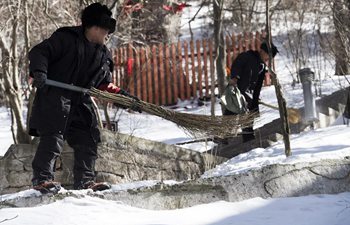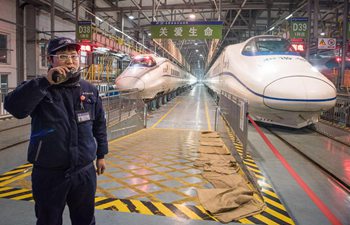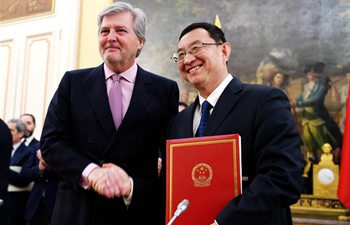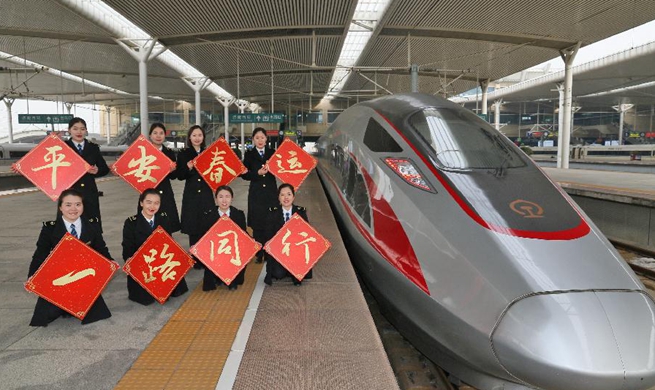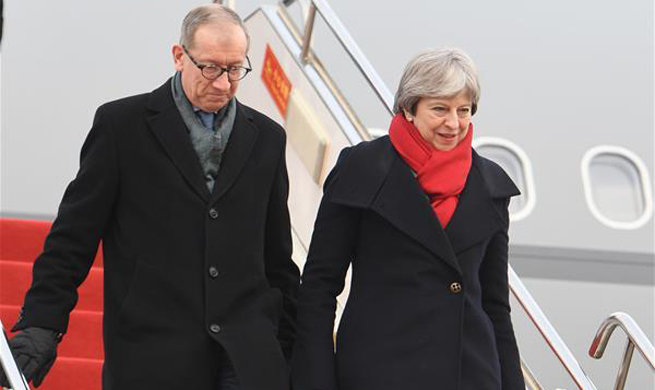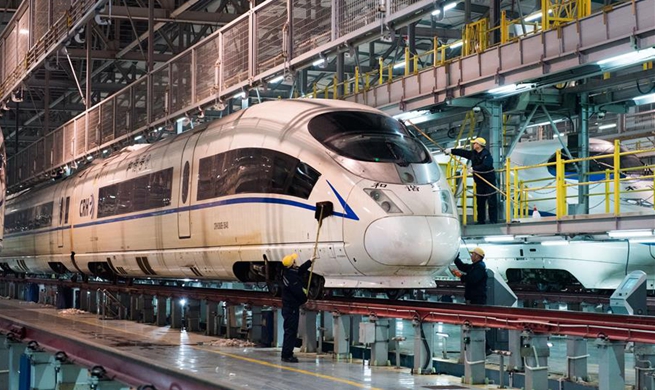by Lu Shuqun and Zhuang Beining
YANGON, Jan. 31 (Xinhua) -- Since the outbreak of terrorist attacks in August 2017, the Myanmar government has taken a series of measures to stabilize the situation and promote economic development.
Recently the Myanmar government invited the Advisory Board for the Committee for Implementation of the Recommendations on Rakhine State and media representatives to visit Rakhine State.
The situation in Rakhine has been stabilized and residents are no longer in fear, observers said. The reception and resettlement of returnees is under way and the local government is actively pushing the region's socio-economic development.
HOUSING FOR RETURNEES
The previous terrorist attacks left many villages destroyed and villagers homeless with some of them fleeing to neighboring Bangladesh. During the visit, the remains of some of the burnt villages could be still be seen, comprising just broken pieces of wood and ashes.
In Hla Pho Khaung, Maundaw Township, however, the government has developed an area of over 100 acres for resettlement.
There are plenty of white tents, some storing food such as rice, noodles and oil.
Near the tents, blocks of wooden houses are being built. There will be a total of 16 blocks, each made up of 40 units and each unit with eight rooms. Each room is designed to hold six people. Altogether, about 30,000 returnees will be resettled here.
The houses will be equipped with electricity and telephones. The government will provide generators to ensure power supply between 6 a.m. to 6 p.m. every day.
Wells and reservoirs will be built nearby to ensure water supply. Public toilets are also being built near the houses. Clinics and hospitals will also be established in the area, according to the government's plans.
ECONOMIC GROWTH, JOB CREATION
Professor Surakiart Sathiratha, chairman of the Advisory Board, pointed out that the security situation has improved and villagers do not feel worried any more. He maintained that Rakhine State is blessed with fertile land and rich water and tourism resources, so there is great potential for increasing incomes and creating jobs.
In order to create jobs and push economic growth forward, the government has taken a series of measures.
Accelerating the construction of the Kanyin Chaung Economic Zone is one of the measures. The construction of the Economic Zone started in November 2015, but with the Rakhine issue looming large, the pace of development has improved.
The economic zone, with an area of over 150 acres, borders Bangladesh, which has a much bigger population and less land. Bangladesh has a huge demand for agricultural products. Agricultural products, including marine products, in the economic zone, will be exported to the neighboring country.
The government also plans to turn this area into a trade hub and develop garment, textile and tourism industries.
Dr. Win Myat Aye, Union Minister for Social Welfare, Relief and Resettlement said, "The Implementation Committee of Recommendations on Rakhine State and other organizations have provided precious advice for the development, prosperity, peace and stability in Rakhine. If the advice is put into practice, we believe the whole state will develop and be free from suffering forever."
VERIFICATION OF DISPLACED PERSONS
The terrorist attacks forced many Myanmar residents to flee to Bangladesh. Myanmar and Bangladesh signed an agreement on the return of the displaced people in November.
According to the agreement, the returnees will be verified in Nga Khu Ya or Taung Pyo Letwe. In theses two places, there are portable houses which have been donated by China, with the two countries' national flags on the walls.
Some of the houses serve as the offices of immigration and other departments. If the returnees are verified as true Myanmar residents, they will be relocated to the Hla Pho Khaung transit camp. The Myanmar side is ready to receive up to 300 returnees daily. Thus far however, due to delays, there have been no returnees.
GOVERNMENT'S EFFORTS PRAISED
Professor Sathiratha spoke highly of the Myanmar government's effort to solve the Rakhine issue and praised the Union Enterprise for Humanitarian Assistance, Resettlement and Development in Rakhine (UEHRD).
State Councilor Aung San Suu Kyi called for setting up UEHRD in October 2017 and prioritized three main tasks to be carried out in Rakhine.
The tasks included the repatriation of refugees who crossed over to Bangladesh and the provision of effective humanitarian assistance. The resettlement and rehabilitation of the refugees was set forth as another task, as was establishing development and lasting peace in the region.
Observers on the visit maintained that the Myanmar government is honoring its commitment.
China has offered humanitarian assistance to Myanmar and maintains close dialogue with both Myanmar and Bangladesh so as to help solve the issue of the displaced people.
Professor Sathiratha commended China's role in the Rakhine issue. He said, "China can play a key role in helping with the repatriation, in providing housing materials."
"China has been working closely with the Union Enterprise. I would encourage China to help the local communities in terms of income and job creation as well as training."
China also proposed a three-phase solution to help settle the issue in Myanmar's Rakhine State. The first phase is to achieve a ceasefire so that local residents need not be displaced.
Secondly, the international community should encourage Myanmar and Bangladesh to maintain communication in a bid to find a feasible solution to the issue.
The third phase is to find a long-term solution.
Poverty has been the root cause of turbulence and conflict in many parts of the world and China has called on the international community to support poverty alleviation efforts in Rakhine State. Enditem





